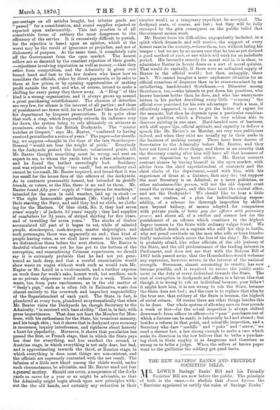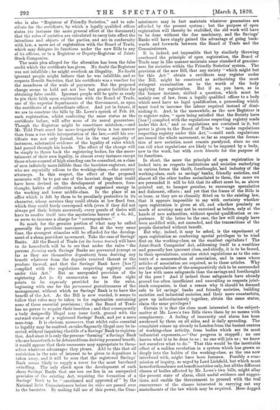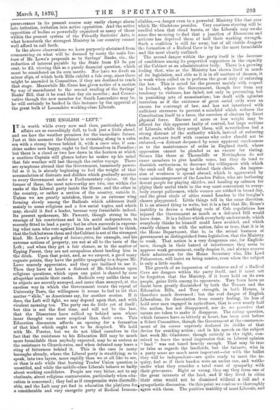THE NEW SAVINGS' BANKS AND FRIENDLY SOCIETIES' BILLS.
ATR. LOWE'S Savings' Banks' Bill and his Friendly ill. Societies' Bill are now before the public. The principle of both is the same,—to abolish that Janus Lifrons the "Barrister appointed to certify the rules of Savings' Banks,"
who is also "Registrar of Friendly Societies," and to sub- stitute for the certificate, by which a legally qualified officer states (to instance the more general effect of the document) that the rules of societies are calculated to carry into effect the intentions and objects of the parties, and are in conformity with law, a mere act of registration with the Board of Trade, which may delegate its functions under the new Bills to any of its officers, or to a Registrar or Deputy-Registrar of Joint- Stock Companies.
The main plea alleged for the alteration has been the false credit which the certificate has given. No doubt the Registrar was not infallible ; he might overlook an illegality. No doubt ignorant people might believe that he was infallible, and as respects Benefit Societies, that his certificate was a voucher for the soundness of the scale of payments. But the proposed change seems to hold out not less but greater facilities for obtaining false credit. Ignorant people will be quite as ready to pin their faith upon registration with the Board of Trade, one of the superior departments of the Government, as upon the certificate of a subordinate officer. And yet in future, if we are to construe the bills by Mr. Lowe's speech of Feb. 10, such registration, whilst conferring the same status as the certificate before, will offer none of its moral guarantees. Though the Registrar might be sometimes mistaken,—and Mr. Tidd Pratt erred far more frequently from a too narrow than from a too wide interpretation of the law,—still his cer- tificate was not only formal, but in the vast majority of instances, substantial evidence of the legality of rules which had passed through his hands. The effect of the change will be simply to throw back the registering bodies, for the ascer- tainment of their own legality, in almost every instance except those where counsel of high standing can be consulted, on a class of men infinitely more fallible than the barrister-registrar, and who are especially odious to the working-class,—the country attorneys. In this respect, the effect of the proposed measures will be to put one of the heaviest drags that could have been devised on the development of prudence, fore- thought, habits of collective action, of organized energy in the working and lower middle-class. In the place of an office which is felt by them to be peculiarly protective in its character, whose services they could obtain at low fixed fees, which they could freely correspond with (even if they did not always get their letters answered), every puzzle of theirs will have to resolve itself into the mysterious horror of a 6s. 8d., or serve to increase a charge for "correspondence."
So much for the genuine portion of what may be called generally the provident movement. But at the very same time, the strongest stimulus will be afforded for the develop- ment of a sham provident movement. Take the case of Savings' Banks. All the Board of Trade (or its locum tenens) will have to do henceforth will be to see that under the rules "the persons forming such Savings' Banks are prevented (except so far as they are themselves depositors) from deriving any benefit whatever from the deposits received thereat or the produce thereof, and that the Savings' Bank have [has ?] complied with the regulations respecting registry made under this Act." But an unrepealed provision of the registering Act (s. 6) enumerates no less than eight points to be expressly provided for in the rules, beginning with one for the permanent gratuitousness of the management, without which no Savings' Bank is to have the benefit of the Act. As the Bill is now worded, it seems to follow that rules may be taken in for registration containing none of these essential provisions ; that the Board of Trade has no power to require their insertion ; and that consequently a body designedly illegal may issue forth, graced with the outward status of a registered Savings' Bank, and yet a mere man-trap. It is obvious, moreover, that whilst rules essential to legality may be omitted, so rules flagrantly illegal may be in- serted, without impairing the title of a Savings' Bank to registra- tion. And since it is only the persons "forming" a Savings' Bank whoare henceforth to be debarred from deriving personal benefit, it would appear that their successors may appropriate to them- selves whatever advantages they please. Add to this that all restriction in the rate of interest to be given to depositors is taken away, and it will be seen that the registered Savings' Bank seems likely to supply a cover for the most barefaced swindling. The only check upon the development of such sham Savings' Banks that one can see lies in an unrepealed provision of the existing Act, requiring the formation of a Savings' Bank to be "sanctioned and approved of" by the National Debt Commissioners before its rules are passed over to the barrister. By making full use of this power, the Corn-
missioners may in fact maintain whatever guarantees are afforded by the present system ; but the purpose of open registration will thereby be stultified, the old work will have to be done without the due machinery, and the Savings' Banks will have simply gained the advantage of going back- wards and forwards between the Board of Trade and the Commissioners.
It is, indeed, not impossible that by similarly throwing overboard the principle of open registration, the Board of Trade may in like manner maintain some standard of genuine- ness for societies within the Friendly Societies' system. The provision of the new Bill, that any society "which might but for this Act" obtain a certificate may register under the Bill, might be construed as authorizing the most stringent examination as to the worth of the body applying for registration. But if so, you have, as in the former instance, shifted a question, which must be mainly one of law, from a legally qualified officer to a body which need have no legal qualification, a proceeding which
must tend to increase the labour required instead of dimi- nishing it. And, in the meanwhile, as the new Registrar is to register rules, "upon being satisfied that the Society have [has ?] complied with the regulations respecting registry made under this Act," and no regulations are contained in it, but
power is given to the Board of Trade to "make regulations respecting registry under this Act,"—until such regulations are issued the whole movement, so far as respects the forma- tion of new societies, must remain paralyzed, since no one can tell what regulations are likely to be imposed by a body, new to the work, but with carte blanche for the purpose of its functions.
In short, the more the principle of open registration is looked into, as respects institutions and societies embodying in various forms the thrift, forethought, and industry of the working-class, such as savings' banks, friendly societies, and almost all the other bodies assimilated to them, the more we are persuaded it will be felt that its effect must be, as above pointed out, to hamper genuine, to encourage speculative and dishonest, efforts ; and yet that the frame of the Bills is so loose, or they are so clumsily fitted on to the existing law, that it appears impossible to say with certainty whether open registration is given at all, and whether precisely as much of scrutiny may not be exercised as before, only at the hands of new authorities, without special qualification or ex- perience. If the latter be the case, the law will simply have been meddled with, not amended, and the transactions of the people disturbed without benefit.
But why, indeed, it may be asked, is the experiment of open registration as conferring special privileges to be tried first on the working-class, on the smallest capitalists? The Joint-Stock Companies' Act, addressing itself to a wealthier and generally less ignorant class, and chiefly, it is to be feared, to their speculations, contains strict regulations as to the con- tents of a memorandum of association, and in cases where articles of association are required, as to these articles. Why are the speculations of the comparatively rich to be surrounded by law with more safeguards than the savings and forethought
of the poor ? And if indeed those safeguards have already proved too often insufficient and unavailing as respects joint- stock companies, is that a reason why it should be deemed safe to let savings' banks and friendly societies, building societies and industrial societies, and their mere counterfeits, grow up indiscriminately together, obtain the same status, claim the same privileges ?
Certain it is that the class most interested in the subject- matter of Mr. Lowe's two Bills views them by no means with complacency. A feeling of insecurity and alarm has been awakened by them on all sides, and is daily spreading. The complaint comes up already to London from the busiest centres of working-class activity, from bodies which are its most influential exponents,—" Our progress is stopped ; no one knows what is to be done to us ; no one will join us ; we know not ourselves what to do." That this would be the inevitable effect of a sudden revolution in a system which has grown so deeply into the habits of the working-class, as the one now interfered with, might have been foreseen. Possibly a com- mission of inquiry, as urged by Lord Lichfield, but which must henceforth embrace not benefitsocieties only, but allthe different classes of bodies affected by Mr. Lowe's two bills, might allay the present state of alarm, elicit useful evidence and sugges- tions, and enable the Government to proceed with the real concurrence of the classes interested in carrying out any amendments of the law which may be required. Mere dogged
perselerance in its present course may easily change alarm into irritation, irritation into active opposition. And the active opposition of bodies so powerfully organized as many of those within the present system of the Friendly Societies' Acts, is what henceforth the strongest Ministry in our country cannot well afford to call forth.
In the above observations we have purposely abstained from commenting on what will be deemed by many the main fea- ture of Mr. Lowe's proposals as to Savings' Banks, viz., the reduction of interest payable by the State from £3 5s. per cent. to £3, viewing this as a purely financial question, which must be considered on its own merits. Nor have we dwelt on minor slips, of which both Bills exhibit a fair crop, since these might be amended in Committee, if they are destined to reach that stage. Meanwhile Mr. Cross has given notice of a motion 'y way of amendment to the second reading of the Savings' Banks' Bill, that it be read that day six months ; and Conser- vative though the new member for South Lancashire may be, he will certainly be backed in this instance by the approval of the great bulk of Lancashire working-class Liberals.




































 Previous page
Previous page